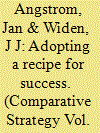| Srl | Item |
| 1 |
ID:
114866


|
|
|
|
|
| Publication |
2012.
|
| Summary/Abstract |
The prevailing explanation of the institutionalization of the principles of war is misleading. Although the introduction of the principles into Western doctrine coincided with total war and the need to train unprecedented numbers of soldiers and junior officers in tactics, the fact that the principles disappeared from doctrines immediately prior to and during the Second World War suggests that they were not institutionalized to meet an increased need to educate the military. Instead, we test two other explanations: one drawing on the principles' military effectiveness and one drawing upon the principles' explanatory power. We find that neither one of these hypotheses stand. Instead, we conclude by elaborating on how the institutionalization of the principles of war can be made understandable using non-rationalist frameworks, in particular the growth of a particular kind of identity of staff officers in the late nineteenth and early twentieth century. According to this framework, the two world wars interrupted-rather than promoted-the institutionalization of the principles, since the wars with their large death tolls and mass recruitment increased the difficulties of creating a separate and unique identity for the burgeoning corps of staff officers.
|
|
|
|
|
|
|
|
|
|
|
|
|
|
|
|
| 2 |
ID:
100014


|
|
|
|
|
| Publication |
2010.
|
| Summary/Abstract |
This article examines the way that gender values and norms underlie the definition and development of peacekeeping missions, and how, in turn, these might contribute to changing prevailing gender regimes within military forces. The article starts with a revision of the gendered nature of the military, brings in the topic of changing professional identities in modern armed forces, and proceeds with an examination of key issues and contradictions in contemporary discourses on gender and peacekeeping. Based on empirical evidence from a variety of research projects conducted since the early 1990s, and with a special focus on the role and integration of women soldiers in peacekeeping, it questions the extent to which peacekeeping missions, and specifically what has been labelled a new gender regime in peacekeeping, have the potential to challenge previously dominant conceptions and practices of gender roles in military culture. The article stresses the idea that only a context-sensitive analysis will allow us to adequately account for and understand the gender dimension of peacekeeping culture.
|
|
|
|
|
|
|
|
|
|
|
|
|
|
|
|